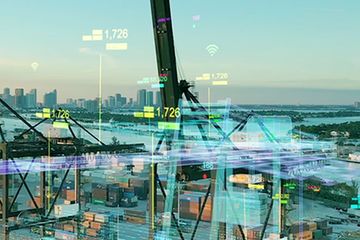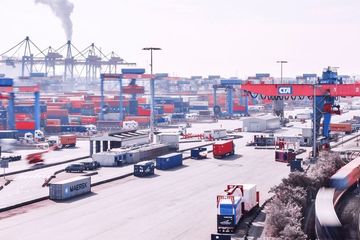Redefining Efficiency and Safety in Marine Terminals
As the gateway between maritime transport and the wider supply chain network, a marine terminal is a complex system of berths, quays, handling equipment, storage facilities and intricate logistics processes. To optimise the performance of these terminals, mitigate risks and improve overall productivity, simulation technologies have proven to be indispensable tools.
HPC marine terminal simulation involves the creation of a virtual environment leveraging the power of HPCsim simulation toolbox that replicates the various aspects of terminal operations. This includes vessel movements, cargo handling, storage, and transportation within the terminal. The simulation model takes into account factors such as vessel types, weather conditions, navigational challenges, and human interactions, offering a dynamic and interactive platform for training, analysis, and decision-making.
The main objectives of marine terminal simulation include improving operational efficiency, reducing turnaround times, minimising wasted resources and improving safety protocols. Simulation allows stakeholders, including terminal operators, port authorities and shipping companies, to test different scenarios, assess the impact of operational changes and identify areas for improvement without disrupting real operations.
Carsten Eckert
Your contact for your marine terminal-related questions.
Read the Latest Article:
Determining the Optimal Volume Trigger Points to Right-size Terminal Equipment
SCOPE OF MARINE TERMINAL SIMULATION AT HPC
Maximizing Potential: Using Simulations to Determine Optimal Scenarios for Peak Productivity and Performance Growth
HPC's marine terminal simulations stand out with their versatile application scenarios and tailored service components, providing a comprehensive approach to determining the optimal utilization of terminal capacity. The most common areas of application that we are asked about are:
Verification of Terminal Design: Ensure that the proposed terminal design meets operational requirements and identify potential design flaws or inefficiencies.
Compare Layout Alternatives: Perform a thorough analysis of various layout alternatives to determine the most optimal configuration in terms of efficiency, safety, and overall performance.
Determine Equipment Numbers: Use simulation to calculate the ideal number of handling equipment, such as cranes and loaders, required to efficiently handle the expected cargo volumes.
Identify Improvement Measures: Pinpoint areas for improvement in terminal design, processes, and logistics to improve overall operational efficiency.
Our Approach
Scaling Terminal Layout: Using HPC’s capabilities to scale terminal layouts efficiently, accommodating various scenarios and potential changes in operational conditions.
Considering of All Cargo Flows and Equipment Moves: Incorporating a comprehensive analysis of all cargo flows and equipment movements within the terminal to provide a holistic view of operational dynamics.
All Available Equipment Types: Integration of data across a wide range of available handling equipment types to simulate different equipment configurations and assess their impact on terminal performance.
Excellent Accuracy Considering Terminal-Specific Process and Operating Strategies: Ensuring high accuracy by tailoring simulations to the specific processes, strategies, and operational characteristics of each terminal.
Benefit from the Highest Possible Degree of Accuracy and Efficiency
We provide detailed insights into the productivity levels of handling equipment and the overall service levels within the terminal, enabling stakeholders to make informed decisions for optimization.
Utilization Rates, Working Hours, Energy Consumption deliver data on equipment utilization rates, working hours, and energy consumption, allowing for an assessment of resource efficiency and environmental impact.
HPC's Marine Terminal Simulation services offer a detailed analysis of terminal operations with a focus on accuracy, efficiency, and customization to terminal-specific requirements.



